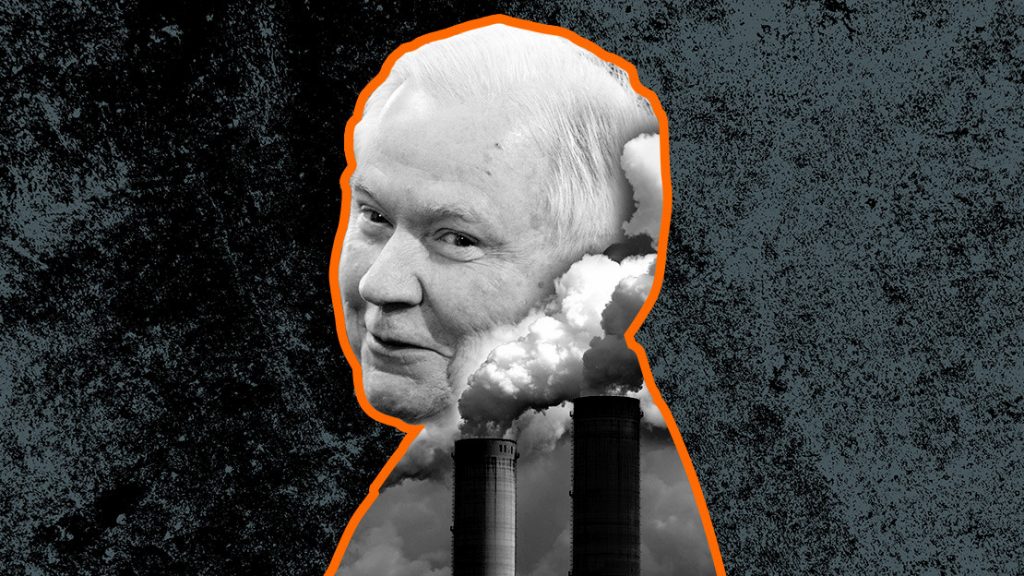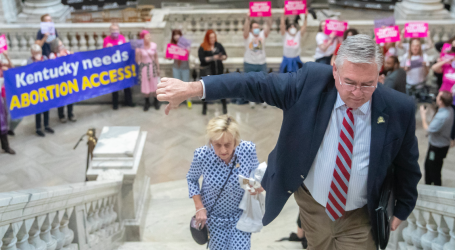Jeff Sessions Has a Huge Conflict of Interest in a Federal Bribery Case—and It Keeps Getting Worse
Mother Jones illustration
Looking for news you can trust?Subscribe to our free newsletters.
As Alabama’s junior senator, Jeff Sessions was far more involved than previously known in helping two of his top contributors derail a federal environmental cleanup effort, according to records obtained under the Freedom of Information Act by Mother Jones and the Project on Government Oversight. The stalled cleanup is now at the center of a federal bribery case spearheaded by the Justice Department, posing a serious conflict of interest for Sessions, who is now attorney general. Yet there is no indication that Sessions has taken any steps to recuse himself from this matter.
Last fall, the Justice Department indicted a top executive at Drummond Coal and two partners in the influential Birmingham-based law firm of Balch & Bingham, who were representing the Alabama-based company. Prosecutors allege the men paid off an Alabama state representative, Democrat Oliver Robinson, as they undertook an all-out effort to block an environmental remediation effort in an impoverished, largely African American neighborhood of North Birmingham, known as 35th Avenue. Robinson, who pleaded guilty to charges of bribery, conspiracy, and fraud, admitted signing his name to letters opposing the cleanup that were ghostwritten by the Balch & Bingham attorneys and to surreptitiously recording meetings with Environmental Protection Agency officials.
The 35th Avenue neighborhood, coated in an ever-present layer of black soot, is sandwiched between several major industrial sites, including a coal-processing plant operated by Drummond, and is located downwind from a variety of toxic emissions. Residents have long reported unusually high incidences of respiratory illnesses and cancer. The EPA discovered such high levels of dangerous toxins in the area that, in 2013, it designated a 400-acre swath of the 35th Avenue neighborhood for a cleanup under the Superfund program. Approximately 1,300 similarly designated sites exist around the country, but because of funding shortfalls only a fraction are added to what is known as the National Priorities List—sites that receive substantial federal resources. The EPA took the initial steps in that process, proposing to add the 35th Avenue site to the NPL and naming five “potentially responsible parties” for the pollution—companies, including Drummond, that operated industrial plants in the vicinity and that would be pursued by the federal government to help pay for the cost of a major cleanup. But the agency’s efforts to remediate the polluted neighborhood ran into a brick wall of opposition from Alabama officials and lawmakers, a level of pushback that federal officials often found puzzling.
“They were really, really pressing, trying to press senior officials to overrule what our decision was in the region,” recalls former EPA official Heather McTeer-Toney. “They wanted to go over our head, way over our head.”The lengths that Drummond and Balch allegedly were willing to go to block the site from getting on the NPL became clear last summer, when the bribery charges against Robinson were unveiled. His indictment—and subsequent guilty plea—shocked EPA officials, who now understood the aggressive and well-funded effort they were up against.
“The facts set forth in the plea agreement are staggering, astonishing really,” Robert Caplan, a senior EPA attorney, wrote in a July 2017 email to Anita Davis, the regional chief of EPA community engagement on Superfund issues. “I didn’t know if you had seen this, or if you are aware of the vast scope of the lies and deception from Robinson, in concert with Balch and Bingham and Drummond/ABC.” (ABC is the name of Drummond’s plant.)
But Robinson wasn’t the only Alabama politician working to oppose the EPA. Various officials stepped up to the plate for Balch and Drummond. There is no evidence the officials were clandestinely paid to do so. Rather, both firms have sought influence the traditional way—through generous donations to state legislators and members of the state’s congressional delegation. One of the most powerful allies Balch and Drummond had in their corner was then-Sen. Jeff Sessions, a Republican who has particularly closes ties to both firms, which ranked second and third, respectively, as his biggest sources of campaign contributions over the course of his Senate career. Now, as attorney general, Sessions is ultimately overseeing the ongoing bribery case, which not only involves two of his top contributors but an environmental cleanup effort in which he directly intervened as Alabama’s junior senator.
In October, Mother Jones and POGO reported on Sessions’ significant conflicts of interest in the case. The story reported that, in December 2015, a Balch & Bingham newsletter touted a meeting with Sessions to discuss the 35th Avenue site and predicted a letter, signed by top Alabama lawmakers, would shortly be sent to the EPA expressing concerns over the agency’s methodology when it came to assigning blame. Soon after, in late February 2016, a letter signed by Sessions, Sen. Richard Shelby (R-Ala.), and Rep. Gary Palmer (R-Ala.) was indeed sent to the EPA. Sessions declined to comment on his role in putting together the letter, which parroted Drummond’s talking points, but EPA documents subsequently obtained by Mother Jones and POGO show that his office was deeply involved in coordinating the effort to thwart the EPA cleanup. Not only did his office take the lead on drafting the letter of complaint, it arranged a contentious meeting with EPA officials to press them to back off their efforts to clean up the polluted neighborhood.
The documents reveal that a Sessions aide named Brandon Middleton sent the February letter to the EPA, then followed up twice by email to confirm the agency’s congressional liaison had received the missive.
In June 2016, several months after the letter was sent, Middleton contacted the liaison again to request a meeting with Heather McTeer-Toney, the administrator for EPA’s Region 4, which includes Alabama, and Mathy Stanislaus, an EPA assistant administrator who was further up the pecking order at the agency. Middleton sent an agenda for the meeting that cited five “issues of concern”—which included critiques of the testing methods used by the EPA to determine blame for the pollution. Middleton, who did not return a request for comment, told the EPA that Sessions, Shelby, and Palmer were all scheduled to attend.
When the EPA officials later showed up at Sessions’ office, none of the lawmakers were present. (Sessions spent the day with then-candidate Donald Trump, who was visiting the Senate to mend relationships with other Republican senators.) Instead, the EPA officials met with members of Sessions’ staff, who aggressively argued against the EPA adding the 35th Avenue site to its priority list.
“I was surprised neither senator had attended because they really pushed for a direct face-to-face with me,” Stanislaus says. “I simply recall it was pretty strident in terms of objecting to the listing.”
The confrontational tone of the meeting matched the tenor of the letter Sessions, Shelby, and Palmer had sent, and it mirrored similar letters sent to the EPA by top Alabama state officials. Stanislaus says he was surprised by the vigorous opposition, given the dangerous level of contamination in the area.
“This site was a pretty pronounced kind of exposure concern. For residents, there was an immediate threat,” Stanislaus says. “The public health risk didn’t seem to be a prominent concern from those who opposed it.”
Recalling the meeting and the letter, Stanislaus says he found it odd that such high-ranking officials would be so interested in the technical details of the EPA’s work on the site, one of 18 Superfund sites in the state.
McTeer-Toney, who notes the EPA’s regional office wanted to put the site on the NPL, says she was similarly taken aback by the opposition from Sessions and other lawmakers. “They were really, really pressing, trying to press senior officials to overrule what our decision was in the region,” she recalls. “They wanted to go over our head, way over our head.”
As a result of this opposition, the 35th Avenue site is stuck in a kind of limbo. It remains on a list of locations proposed for the NPL, but under the Trump administration, it still hasn’t received the federal cleanup that residents and local environmental groups have been clamoring for. Trump’s EPA and Justice Department—which would lead the effort to recoup cleanup costs from Drummond and the other companies accused of polluting the neighborhood—have been stacked with Sessions loyalists and ex-Alabama officials who fought the EPA’s efforts in North Birmingham.
McTeer-Toney’s replacement as the head of the EPA’s Region 4, for example, is Trey Glenn, a former Alabama environmental official who stated on his financial disclosure forms that in 2016, Balch & Bingham had hired him for work related to the 35th Avenue site. Glenn’s EPA spokesman emailed that “Mr. Glenn has recused himself where appropriate,” but he did not address whether that included 35th Avenue matters. Meanwhile, a former Balch & Bingham lawyer named Jeff Wood is currently the head of the Justice Department’s Environment and Natural Resources Division—the section that would pursue legal action to force Drummond and the other polluters to pick up the tab for cleanup costs, if the site received an NPL designation. Wood, who also once served as a Senate aide to Sessions on environmental issues, has recused himself from any matters involving his former firm. Until recently, one of Wood’s deputies—and the person slated to step in for Wood on matters he had recused himself from—was Brandon Middleton, the ex-Sessions aide who helped to coordinate the opposition to the 35th Avenue NPL listing.
A Justice Department spokesman said Wood “is abiding by” his recusal. “Senior career deputies along with other non-career appointees—not otherwise recused from these matters—are able to ensure that the work of the Department carries forward in matters where” Wood is recused, the spokesman told Mother Jones and POGO in an email. At some point after early December, Middleton left the Justice Department. He now works as a deputy solicitor in the Interior Department, providing legal advice inside that agency.
Oliver Robinson, the Alabama state senator, is currently awaiting sentencing, but he has agreed to cooperate with prosecutors in their case against the two Balch lawyers, Joel Gilbert and Steven McKinney, and the Drummond executive, David Roberson. In February, attorneys for the three men filed to have the bribery charges against their clients dismissed, citing the 2016 US Supreme Court’s ruling overturning the corruption convictions against former Virginia Gov. Bob McDonnell (R). That decision makes it substantially harder to prosecute bribery charges because it limits what actions are defined as “official acts” by a public official. In the Alabama case, the defendants are arguing that they did not bribe Robinson to commit any official acts—they simply had a consulting contract with him. The prosecution has not yet responded to the argument.
After Mother Jones and POGO first reported on Sessions connections to the 35th Avenue bribery case last fall, Sen. Patrick Leahy (D-Vt.), who sits on the Senate Judiciary Committee, asked the attorney general in writing if he planned to recuse himself from the matter. A Leahy staffer says Sessions has yet to respond to the senator’s question.
Sarah Isgur Flores, a spokeswoman for Sessions, would not say if the attorney general had recused himself from the investigation.
“We don’t comment on recusals—as the AG explained during his opening testimony a few months ago, to do so could confirm the existence of investigations and the stage at which they may be at,” Flores said.
Flores acknowledged that the existence of the investigation and current prosecution is public knowledge but said that discussing recusal issues still “could relay information on what stage it is at and whether it is a matter that has come to the AG’s office for example.” Flores declined to answer any questions about Sessions involvement with the Drummond case during his time as a senator.
David Sklansky, a law professor at Stanford University who specializes in prosecutorial ethics, says the Justice Department’s rules on recusal are clear and leave little question that Sessions should formally stand aside.
“The standards for disqualification apply whenever there’s a personal or political relationship with a person or organization,” he says. “I think the grounds for disqualification here are particularly strong—you have an official who not only has a long-standing personal relationship with organizations that are involved in the subject of the investigation, but you’re also dealing with an official who himself was involved in conduct that is connected with the conduct that’s under investigation.”
At the same time, there is no mechanism to force Sessions’ recusal, Sklansky says. It’s entirely up to him. It’s possible that Sessions has internally made clear that he intends to step aside from the Drummond-Balch case. But if he has, Sklansky argues, the attorney general should disclose that fact publicly in order to preserve the “integrity and the credibility of the Department of Justice.”
Image credit: Erin Schaff/CNP/ZUMA; Getty Images




